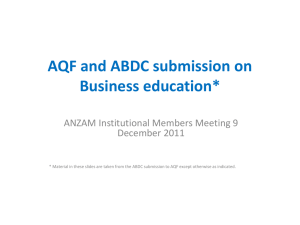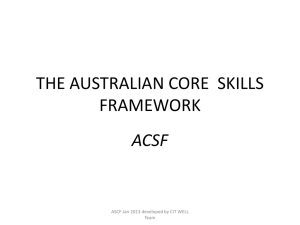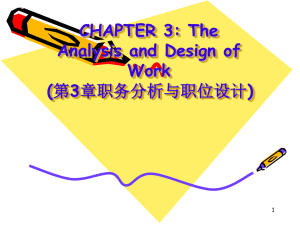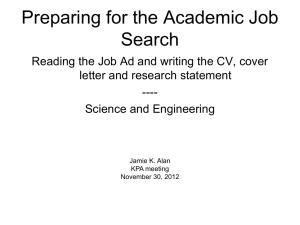The AQF
advertisement
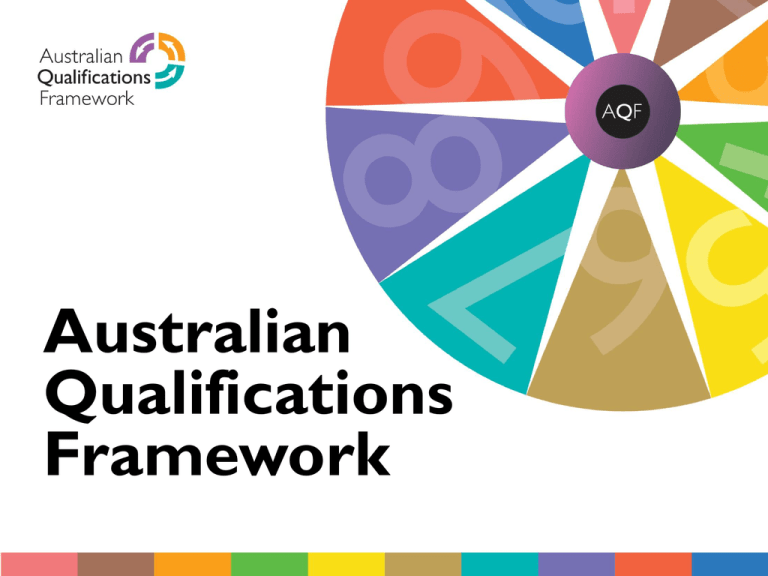
AQF cover Australian Qualifications Framework Presented by: Di Booker Director (Policy) AQF Council WA Universities Workshop Perth, 19 September 2012 Today’s session AQF – what does it represent Design of the AQF Policy framework How the AQF operates Relationship with accrediting authorities Implementation arrangements The AQF is Australia’s national policy for regulated qualifications delivered in all education sectors Review of AQF ‘A stronger qualifications framework will help build confidence in our system; • make it easier for students to move between education sectors; • will result in an increasingly integrated tertiary sector with stronger pathways between VET and higher education; and • … greater connectedness between Australia and the global education market’ MCTEE November 2010 The AQF The philosophy underpinning the strengthened AQF is lifelong learning Its focus is student acquisition of knowledge, skills and their application as they progress through their education and working lives It sets the standards for each Australian qualification type It is designed to support student mobility and provides the national policy for student pathways Objectives of the AQF To provide a contemporary and flexible framework that: 1. accommodates the diversity of purposes of Australian education and training now and into the future 2. that contributes to national economic performance by supporting contemporary, relevant and nationally consistent qualification outcomes which build confidence in qualifications 3. supports the development and maintenance of pathways which provide access to qualifications and assist people to move easily and readily between different education and training sectors and between these sectors and the labour market 4. supports individuals lifelong learning goals by providing the basis for individuals to progress through education and training and gain recognition for their prior learning and experiences 5. underpins national regulatory and quality assurance arrangements for education and training 6. supports and enhances the national and international mobility of graduates and workers through increased recognition of the value and comparability of Australian qualifications 7. enables the alignment of the AQF with international qualifications frameworks AQF First edition July 2011 1. 2. 3. 4. 5. 6. 7. 8. Introductory sections AQF levels criteria and qualifications descriptors AQF qualification type specifications AQF policies AQF glossary of terminology Implementation arrangements Principles and processes for alignment of the AQF with international qualifications frameworks Overview of qualifications frameworks in Australia Recognising the AQF Taxonomy of learning outcomes Levels criteria and qualification type descriptors use the same taxonomy: - knowledge skills application of knowledge and skills Generic learning outcomes are embedded across these domains Qualifications descriptors The descriptors for qualification types are consistently expressed to assist with better understanding of qualifications across sectors. The common language of all qualification types will also assist with negotiating and designing pathways between general education and competency based training to maximise potential credit. Qualification type specifications Describe how the AQF is applied in the accreditation and development of qualifications Includes reference to the levels criteria, qualifications descriptors and the volume of learning which must be ‘sufficient for graduates to achieve the learning outcomes for a qualification of … (the) level and type’ Includes reference to the policy framework of the AQF Masters Degree qualification type descriptor Purpose Qualifies individuals who apply an advanced body of knowledge in a range of contexts for professional practice or scholarship and as a pathway to further learning Knowledge Graduates will have: • a body of knowledge that includes the understanding of recent developments in a discipline and/or area of professional practice • knowledge of research principles and methods applicable to a field of work and/or learning Skills Graduates will have: • cognitive skills to demonstrate mastery of theoretical knowledge and to reflect critically on theory and professional practice or scholarship • cognitive, technical and creative skills to investigate, analyse and synthesise complex information, problems, concepts and theories and to apply established theories to different bodies of knowledge or practice • cognitive, technical and creative skills to generate and evaluate complex ideas and concepts at an abstract level Masters Degree qualification type descriptor (continued) Skills (continued) Graduates will have: • communication and technical research skills to justify and interpret theoretical propositions, methodologies, conclusions and professional decisions to specialist and non-specialist audiences • technical and communication skills to design, evaluate, implement, analyse and theorise about developments that contribute to professional practice or scholarship Application of knowledge and skills Graduates will demonstrate the application of knowledge and skills • with creativity and initiative to new situations in professional practice and/or for further learning • with high level personal autonomy and accountability • to plan and execute a substantial research-based project, capstone experience and/or piece of scholarship Volume of learning The volume of learning of a Masters Degree is typically 1-2 years… Volume of learning The volume of learning assists with a greater understanding of the complexity of qualifications and assists with determining the amount of possible credit The volume of learning identifies the notional duration of all activities required for achievement of the learning outcomes specified for a particular AQF qualification type In the AQF, the volume of learning is expressed as full time equivalent years Volume of learning – Masters Degree (Coursework) The volume of learning of a Masters Degree (Coursework) is typically 1-2 years: in the same discipline: 1.5 years following a level 7 qualification or 1 year following a level 8 qualification in a different discipline: 2 years following a level 7 qualification or 1.5 years following a level 8 qualification The AQF Council’s explanation Organisations responsible for developing, accrediting and issuing AQF qualifications must ensure the volume requirements are met and are sufficient for graduates to achieve the learning outcomes Sufficiency of volume is a matter of professional judgement which references the AQF definition All activities for the achievement of learning outcomes should be taken into account Credit for entry into the qualification must be clearly distinguished from credit received for components of the qualification Variation in the volume of learning must be able to be justified Relationship with the Regulators TEQSA Qualifications Standards are based on the AQF and include reference to AQF specifications and policies TEQSA Qualifications Standards also include standards for non-AQF qualifications NSSC sets the VET standards - AQF qualifications included in training packages ASQA and state VET regulatory authorities responsible for registration of RTOs and accreditation of courses leading to AQF qualifications Regulators will monitor compliance with the AQF AQF Council meeting with Higher Education Standards Panel and National Skills Standards Council Implementation timelines Implementation of the AQF revisions commences on 1 July 2011 For higher education, use of the AQF commenced from the date of commencement of TEQSA (29 January 2012) All qualifications must meet the new requirements by 1 January 2015 – need for accrediting bodies and institutions to have transition policies and processes in place AQF Council is committed to: 1.Supporting Australia’s reputation for high quality qualification outcomes • Providing advice to ministers on qualifications standards • Working cooperatively with the standards setting bodies and regulatory authorities • Undertaking strategic evaluation of the AQF • Reviewing governance arrangements • Improving international recognition of Australian qualifications AQF Council is committed to : 2. Ensuring the integrity of the AQF • Supporting implementation – advice, workshops, engaging in public debate, supporting the development of pathways • Actively working with stakeholders to support implementation • Ongoing review of the AQF to maintain relevance 3. Promoting the use of the AQF • Establishing links with authorities responsible for recognising qualifications, skills or credentials • Promoting the AQF in other sectors and exploring the potential for adding to the AQF • Building links with other countries Contact AQF Council Executive Director: Ann Doolette Enquiries: aqfc@innovation.gov.au +61 8 8406 4735 Visit website: www.aqf.edu.au Subscribe to newsletter: aqfc@innovation.gov.au AQF levels Levels 5 - 7 Higher education qualifications are located at levels 5-10 Level 5 – Graduates at this level will have specialised knowledge and skills for skilled/paraprofessional work and/or further learning Level 6 – Graduates at this level will have broad knowledge and skills for paraprofessional/highly skilled work and/or further learning Level 7 – Graduates at this level will have broad and coherent knowledge and skills for professional work and/or further learning Summary of changes AQF 2007 AQF July 2011 An implicit levels structure based on qualification types An explicit 10 levels structure with criteria based on a taxonomy of learning outcomes. 15 qualification types located at a level (the SSCE not at a level) Characteristics and distinguishing features for each qualification type, expressed as learning outcomes but differently for each sector Specifications for the development and accreditation of qualifications, common for all qualification types An issuance policy for all sectors with protocols for the VET sector An issuance policy covering all sectors incorporating requirements for certification documentation and qualification titles. Protocols and templates aligned with the AQF to be provided by accrediting authorities Summary of changes (continued) AQF 2007 AQF July 2011 Detailed national guidelines on cross-sector linkages between qualifications and national principles and operational guidelines for recognition of prior learning applicable to all sectors A pathways policy encompassing existing articulation, credit transfer and recognition of prior learning, applicable to all sectors An AQF register of accrediting authorities and issuing organisations in all sectors, based on operational practice A register policy specifying criteria for AQF registers of qualifications, accrediting authorities and issuing organisations, applicable in all sectors Operational practice for adding and removing qualification types, with no objective criteria A policy for adding and removing qualification types based on criteria applicable in all sectors Terms not defined AQF glossary of terminology No process for international alignment Principles and processes for international alignment of the AQF How the AQF operates The legal basis for the AQF is through Commonwealth and State Governments’ legislation All AQF qualifications must be accredited by government authorised accrediting authorities (some providers have authority to self accredit) Only government accredited providers can deliver, assess and issue AQF qualifications Providers must meet minimum standards to be accredited and to retain accreditation; accrediting authorities monitor providers to ensure the quality of qualifications issued AQF Governance AQF is owned and funded by all governments AQF Council established under authority of national ministers for education and employment AQF Council’s role is to: • provide policy advice on qualifications • maintain, monitor and promote the AQF • support the users of the AQF AQF Council members include independent chair, higher education, vocational education and training, senior secondary schools, employers, unions, governments, international observer AQF is an integrated policy
